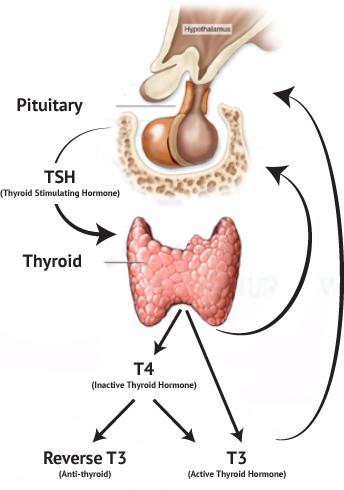Balanced Thyroid
The thyroid gland is the gas pedal of the body. It produces two hormones - triiodothyronine (T3) and thyroxine (T4) - which stimulate your metabolism to promote more cellular activity which speeds up bodily processes. If there is an issue with the thyroid gland (whether excessively low or excessively high activity), it can cause issues throughout the body.
LOW THYROID FUNCTION (HYPO)
Fatigue
Weight gain
Hair loss
Constipation
Feeling cold
Poor memory/concentration
Joint pains
Slow heart rate (bradycardia)
Dry skin
Infertility or repeated miscarriage
HIGH THYROID FUNCTION (HYPER)
Agitation
Insomnia
Heart Palpitations
Fast heart rate (tachycardia)
Weight loss
Diarrhea
Feeling hot
Palpable thyroid growths/nodules
Hypothyroidism has many causes and is more common than hyperthyroidism; but despite being a common condition, hypothyroidism (low thyroid function) frequently goes undiagnosed or is not managed to the satisfaction of the patient. Many patients diagnosed with and treated for hypothyroidism still don’t feel well. They continue to struggle with fatigue, stubborn weight issues, constipation, and hair loss despite their labs being “normal”. If this is you, don’t despair. There is much to be done! I treat the patient, not just the labs.
The best starting point to understand how your thyroid is functioning and how you are responding to your treatment plan is a thyroid panel - a blood test that assesses several aspects of thyroid function.
Like many hormone-producing glands in the body, the thyroid has a complex feedback system which balances its output of thyroid hormones (T3 and T4).
Thyroxine (T4)
The majority of thyroid hormone produced by the thyroid gland is T4, an inactive hormone that must be converted to it’s active form (T3) by the cells of the body. It is made in the thyroid gland from the amino acid tyrosine and four iodine molecules. Nutritional deficiencies in tyrosine, iodine, or zinc can impair adequate T4 production.
Triiodothyronine (T3)
A small amount of T3 is released from the thyroid gland but most is made from T4 at the cellular level (at the area of the body where it’s needed). This is because T3 is the stronger, more active form of thyroid hormone but T4 is easier to transport around the body. The conversion from T4 to T3 involves removing one iodine molecule and requires zinc and selenium. Nutritional deficiencies in zinc or selenium can impair thyroid hormone conversion, leaving you without enough T3.
Thyroid Stimulating Hormone (TSH)
TSH is secreted from the brain’s pituitary gland in response to low T4 or T3 levels. As it’s name suggests, it stimulates the thyroid gland to work harder and release more thyroid hormone (T4 and T3) to the body when the body’s cells don’t have enough. Therefore, hypothyroidism (low T4 or T3) typically results in high TSH levels.
Reverse T3 (rT3)
Reverse T3 is an inactive form of T3. T4 is converted to rT3 instead of T3 during times of chronic stress, starvation, or chronic illness, when the body needs to conserve energy. Since both rT3 and T3 are made from T4, increased production of rT3 results in lower amounts of T3.
CAUSES OF HYPOTHYROIDISM
Hashimoto Thyroiditis: The majority of hypothyroidism is caused by an autoimmune attack against the thyroid gland called Hashimoto Thyroiditis. The body’s immune system is attacking some of it’s own cells, which often results in an initial period of alternating high and low thyroid symptoms (as the thyroid gland is attacked) followed by longterm hypothyroidism.
Nutritional Deficiencies: Like other hormones of the body, thyroid hormone is made of building blocks through a process which requires certain nutrients. For the thyroid, those building blocks and helper nutrients are tyrosine, iodine, zinc, and selenium. A deficiency in any of these key nutrients can cause hypothyroid symptoms. Tyrosine is an amino acid that you get from eating protein. Iodine is found in iodized sea salt and sea vegetables (eg. kelp). Zinc is found in seafood, meat, legumes, nuts and seeds. Selenium is found in nuts and seeds, especially brazil nuts.
Conversion Disorder: An issue with the enzyme required for the conversion of T4 to T3 results in normal T4 levels, normal or high TSH, and low T3 levels. In these cases, patients given the commonly prescribed thyroid medication Synthroid (synthetic T4) will still feel unwell since the body is not able to convert the T4 into its active form (T3).
Thyroid Hormone Resistance: Hypothyroid symptoms can also occur when T3 and T4 are present in the right amounts but the cells are not responding, similar to insulin resistance in diabetes. This results in elevated TSH levels despite normal T3 and T4, and typically indicates a need for adrenal support.
LAB TESTING
If you’re experiencing the symptoms listed above, it is likely that your doctor checked your TSH level. If it came back normal (0.30-5.5mU/L), you were probably told your thyroid is fine and no further thyroid testing was done. Unfortunately, there is a difference between a lab value falling within the reference range and within the ideal range. While a TSH value between 0.30 and 5.5mU/L is considered normal, ideally your TSH should not be above 2.5mU/L.
TSH is the most commonly run thyroid test, but a normal TSH value does not rule out hypothyroidism. In a study of over 2000 patients with suspected hypothyroidism, only 24% of confirmed hypothyroid patients had elevated TSH values. Your thyroid function depends on much more than just your TSH value so it’s important to assess your T4 and T3 levels as well, and possibly check for antibodies that may be attacking the thyroid gland (as seen in Hashimoto Thyroiditis). This stands both for diagnosing thyroid issues and monitoring you through treatment if a thyroid issue has been confirmed.

